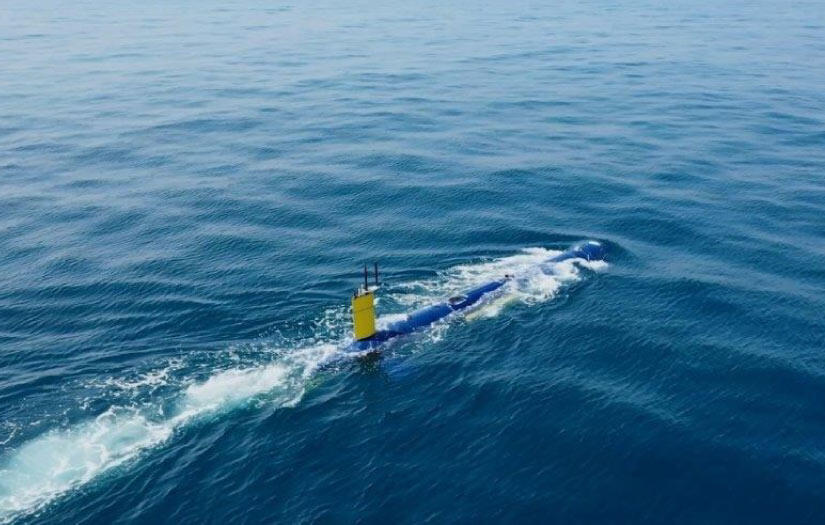Getting your Trinity Audio player ready...
The German Navy recently concluded a two-week evaluation of the BlueWhale autonomous underwater vehicle (AUV), a cutting-edge system developed by the state-owned Israel Aerospace Industries (IAI). The evaluation was conducted in the Baltic Sea by a 5.5-ton submarine equipped with a telescopic mast with radar and electro-optic systems. The AUV can perform complex tasks for several weeks, identify sea and land targets, and transmit data to command posts worldwide.
The trials also highlight the growing defense partnership between Israel and Germany. BlueWhale’s evaluation follows other high-profile collaborations, including the recent Arrow missile air defense system deal, which reflects the strategic alignment between the two nations in addressing mutual security challenges. The German Navy partnered with IAI and ATLAS Elektronik for the trials, and the NATO Centre of Excellence for Operations supported the integration of the BlueWhale into the German Navy’s framework.
The test comes after undersea internet cables in the Baltic Sea were physically cut, an act suspected of Russia-led sabotage. On November 18, two undersea telecommunications cables were severed, disrupting communications between Finland, Germany, Lithuania and Sweden. The incidents have raised concerns, and German Defense Minister Boris Pistorius labeled them “sabotage.”
In light of this suspected undersea cable sabotage, the BlueWhale is reportedly strengthening the German Navy’s objectives. With its advanced monitoring capabilities and autonomy to operate for extended periods, the unmanned Israeli submarine can provide a critical tool for monitoring and protecting vital undersea infrastructure.
Since the beginning of the war in Ukraine, Germany’s defense policy has changed substantially; the government has planned to modernize its forces and meet NATO’s defense spending target of 2% of GDP. The country’s updated defense strategies, outlined in the “German Navy Objectives for 2035 and Beyond,” reason that with the accession of Finland and Sweden to NATO, the Baltic Sea must be integrated into NATO’s maritime security, a move that puts them in potential conflict with Russia.
The German Navy’s efforts to strengthen its capacity in the Baltic Sea are a significant challenge for Russia, as the area is critical for Moscow’s ambitions. A more robust German naval presence – bolstered by advanced technologies like the BlueWhale and increased NATO coordination – undermines Russia’s ability to project power and operate covertly in the region. Such an enhanced military presence counters Russia’s hybrid threats, including cyber and physical sabotage, hallmarks of Putin’s tactics.
IAI President and CEO Boaz Levy said in a statement that “in addition to its intelligence-gathering capabilities, the BlueWhale system excels in detecting other submarines and covertly mapping mines on the seabed, using its advanced sonar systems, and is an important part of IAI’s range of maritime solutions, which include the protection of Economic Exclusion Zones, defensive and offensive system suites for marine vessels, and the management of the arena in which autonomous vessels are operating.”
Russia’s invasion of Ukraine and the subsequent conflict have been catalysts for German military spending, leading to substantial enhancements in military spending, reforms, a more proactive role in the defense of Europe, and support for NATO. However, Germany’s acquisition of Israeli defensive systems doesn’t put Israel on a collision course with Russia.
IAI reveals unmanned spy submarine
(Video: ILTV)
Kobi Michael, a researcher at INSS and the Misgav Institute for National Security and Zionist Strategy, said that “as long as Israel doesn’t supply Ukraine with weapons and mainly offensive weapons, I do not think that Russia can say something, especially when Russia supplies weapon to Hezbollah and aerial defense systems to Iran.”
Similarly, Jeremy Issacharoff, Israel’s former ambassador to Germany, said that: “Over the last decades, the Israel-Germany relationship has evolved into one of Israel’s most important strategic partnerships –second only to the United States. It’s remarkable considering diplomatic relations only began in 1965.”
Get the Ynetnews app on your smartphone: Google Play: https://bit.ly/4eJ37pE | Apple App Store: https://bit.ly/3ZL7iNv
While the Holocaust remains an ever-present historical factor between Israel and Germany, the relationship has matured into one of trust and cooperation, especially in defense and intelligence, the former ambassador highlighted.
“These deals weren’t about historical guilt – they were based on Germany’s recognition of Israeli technology as the best fit for their defense needs. Moreover, high-level visits between Israeli and German leaders increased significantly. This wasn’t just Germany supporting Israel; it was Israel committing to Germany’s security as well,” Issacharoff added.





